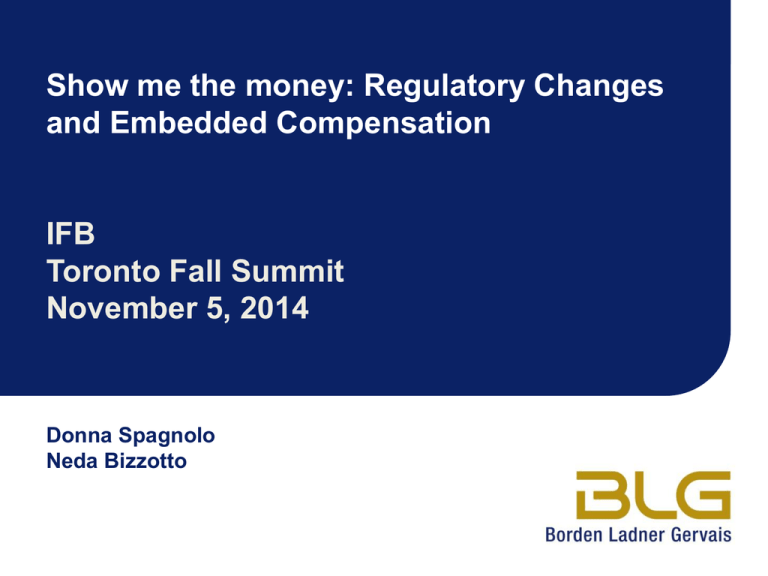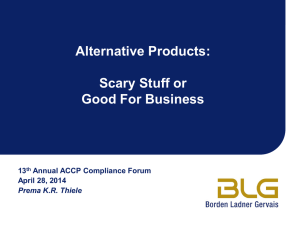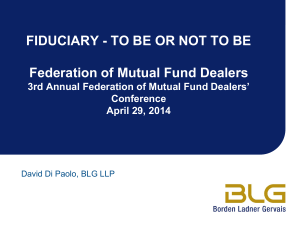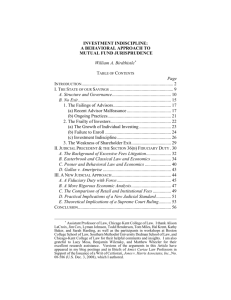CSA – Best Interest Duty - Independent Financial Brokers of Canada
advertisement

Show me the money: Regulatory Changes and Embedded Compensation IFB Toronto Fall Summit November 5, 2014 Donna Spagnolo Neda Bizzotto PAST Mutual Fund Fees Paper - Why? Perception persists that investors in mutual funds are among the most “retail” of retail investors • Financial literacy • Investor protection Concerns: Difficult to comprehend disclosure and lack of understanding by investors, especially on fees and risks Conflicts of interest inherent in industry practices (mostly around compensation) Fairness Complexity of products • Other • Conflict of Interest • International changes CSA Paper – Mutual Fund Fees Paper Issues raised: Prevalence of mutual funds within investment portfolios of Canadians, “Canadian fees are among the highest in the world” Investors do not understand fees, disclosure too complex Conflicts of interest Cross-subsidization Ongoing services to be provided in exchange for embedded trailer commissions not clear (fees for advice) Limited low-cost options for DIY investors 4 Mutual Fund Fees Paper - Considerations Possible changes: • Trailing commissions paid for advisor services • Standard class for DIY investors • Unbundling trailing commission component • Separate series for each purchase option • Cap commissions • Additional standards and duties for advisors • No advisor compensation set by fund manufacturers CSA – Best Interest Duty CSA Consultation Paper “The Standard of Conduct for Advisers and Dealers: Exploring the Appropriateness of Introducing a Statutory Best Interest Duty When Advice is Provided to Retail Clients” – October 2012 OSC hosted three stakeholder roundtables in June-July 2013 OSC 2014 Annual Report - The OSC made it a priority in 2013-14 to re-evaluate how advisors work with their clients. 6 CSA – Best Interest Duty Principal concerns with current regime Asymmetry in investment knowledge Investors believe that best interest duty already present Suitability standard is not enough Conflict of interest disclosure requirements not being employed effectively 7 CSA – Best Interest Standard Every adviser and dealer (and each of their representatives) that provides advice to a retail client with respect to investing in, buying or selling securities or derivatives shall, when providing such advice (a) Act in the best interests of the retail client and (b) Exercise the degree of care, diligence and skill that a reasonably prudent person or company would exercise in the circumstances Duty would constitute a “fiduciary” duty that would not be open to contractual variation, and would only apply when “advice” given to a “retail” client. 8 Key Regulatory Theme = Investor Protection OSC 2014 Annual Report – “Investor protection is a core part of our mandate. This focus has supported our scrutiny of registrant compliance with suitability obligations, our examinations of a best-interest standard for dealers and advisors and the evaluation of mutual fund fee structures and the impact of these on investor outcomes.” 9 Mutual Fund Fees /Best Interest Standard • Mutual fund fees and best interest standard are inextricably linked. • Mutual fund fee paper: 99 comment letters • Statutory best interest duty: 93 comment letters • Plus in-person consultations Investor Advocate Response Key Themes Recommend prohibition on embedded compensation Misalignment of interests Disclosure initiatives are not enough Investors should have TRUE choice Recommend best industry duty for advisors Low advisor proficiency and confusing titles What is a “Financial Advisor”? 11 Industry Response • No evidence of investor harm • Unintended consequences • Reduction in access to advice • Elimination of choice regarding payment of financial advice • Unlevel playing field with competing products • Efforts already underway to strengthen current regime (e.g., CRM, fund facts) • Wait for results of international reforms • Has potential to make registrants guarantors or insurers of their advice – who is responsible for investment decisions? • How is “best” defined? Other jurisdictions: U.S. • Points of differentiation with Canada • Proposal: Reform of trailing commissions to cap aggregate sales charges to investors • “marketing and service fee” • “ongoing sales charge” • conversion of share class • Study: Best interest standard for investment advisers and broker-dealers • Current fiduciary standard for advisers • Current suitability standard + fair dealing for broker-dealers • Study: Financial literacy Other jurisdictions: United Kingdom FSA Retail Distribution Review (RDR) United Kingdom - new rules ended commissionbased system of advisor compensation January 1, 2013 - implementation of an ‘Adviser Charging’ system, as part of its Retail Distribution Review (RDR) Advisor and client set rates (fixed, hourly, etc.) Ongoing fees permitted Compensation based on level of service (rather than product) Restricted advisor Independent advisor New statutory best interest standard for advisors Code of ethics on advisors 14 Other jurisdictions: Australia - Financial Advice reforms Australia - ban on sales commissions and trailer commissions Future of Financial Advice (FoFA) reforms came into effect July 1, 2012 (compulsory as of July 1, 2013) Similar to U.K., negotiate fees, ongoing fees permitted Renew advisory agreements every 2 years (on-going advice) Concept of “Scaled Advice” advice that fits client needs New statutory best interest duty for advisors ‘reasonable steps’ qualification 15 PRESENT Referral Fees/Compensation – Securities Issues • All registrants • National Instrument • IIROC • National Instrument • MFDA • MFDA rules Referral Fees/Compensation – Other Than Securities • Insurance • Provincial rules • Mortgage brokers • Provincial rules • Bank products • Securities? Mutual Fund Fees - Status Disclosure is not enough: • Series with default rate • DSC as default FUTURE Mutual Fund Fees: Regulatory Initiatives CRM2 To provide investors with clear and meaningful information on the costs and performance of their investments Mutual Fund Fees Paper - Status Regulatory next steps: • CSA has awarded two research contracts to review Canada’s mutual fund fee structure: • Evaluate extent to which sales and trailing commissions influence fund sales. • Evaluate extent to which the use of fee-based vs. commission-based compensation changes the nature of advice and investment outcomes over the long term. • How: • Data requests • Literature review • Due: • Both due the first quarter of 2015 Questions? Donna Spagnolo & Neda Bizzotto Borden Ladner Gervais LLP (416) 367-6266 / (416) 367-6066 dspagnolo@blg.com / nbizzotto@blg.com 23








